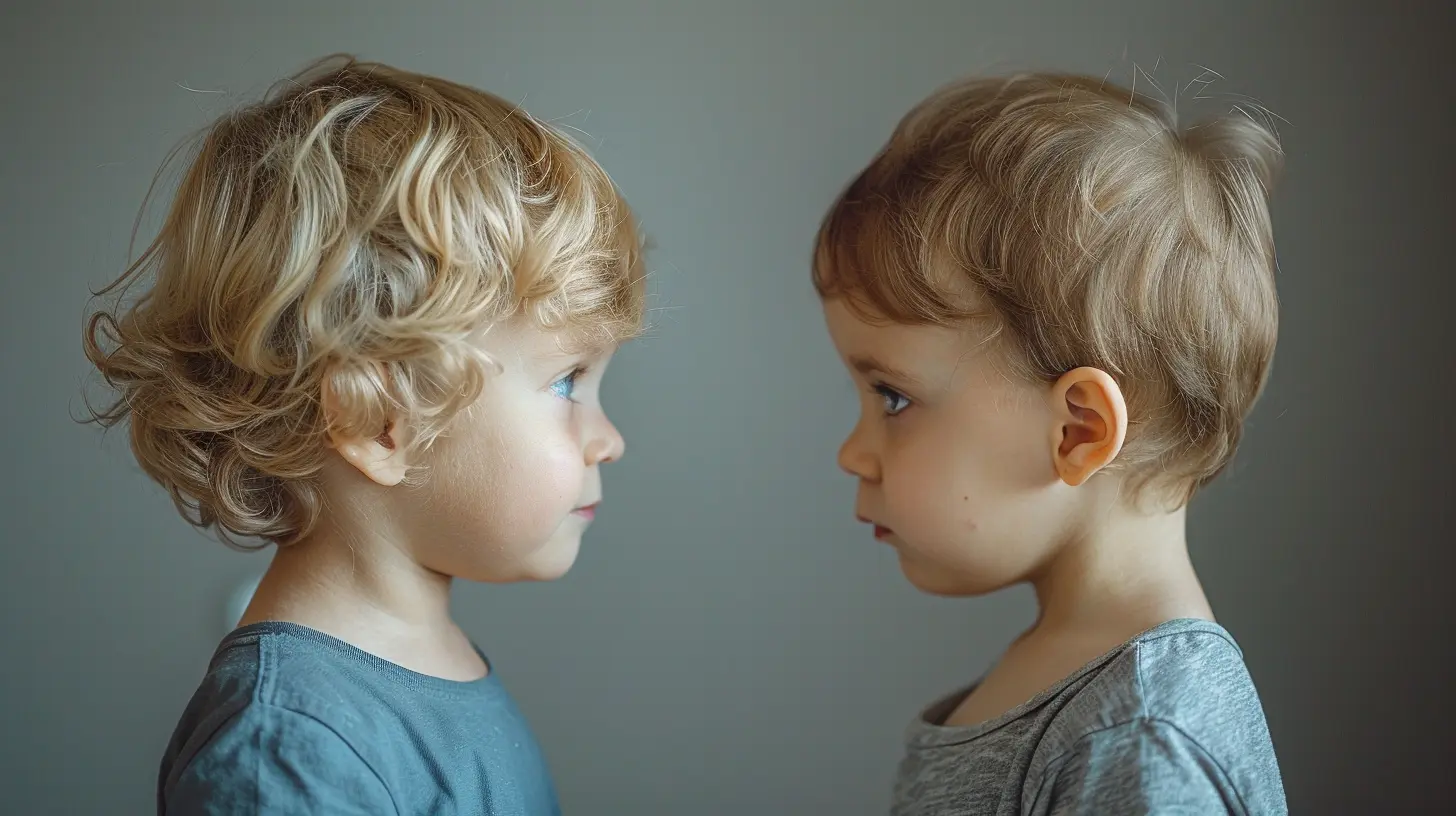Encouraging Teamwork When Siblings Compete
14 October 2025
Sibling rivalry—it’s practically a built-in feature of family life. From who gets the bigger slice of cake to who can run the fastest, competition between siblings is as old as time. If you’re a parent caught in the middle of these battles, you’re not alone. While a little friendly competition can be healthy, too much of it can create tension and unnecessary stress in the home.
So how do we shift from endless bickering to a more cooperative and team-oriented sibling dynamic? Let’s dive into some practical, real-world strategies to encourage teamwork while still allowing each child to shine in their own way.

Why Do Siblings Compete?
Before tackling the issue, it helps to understand why kids compete in the first place. Sibling competition often stems from:- Wanting attention – Kids naturally crave a parent's love and approval. When they feel like they have to compete for it, rivalries are born.
- Desiring fairness – "That’s not fair!" is a phrase every parent hears far too often. Children are highly sensitive to perceived inequalities and may compete to ensure they don’t get the short end of the stick.
- Different personalities – One child may be fiercely competitive, while another prefers cooperative play. These differences can breed conflict.
- Limited resources – Whether it’s toys, screen time, or space, kids often feel like they need to fight for their share.
- Comparisons (intentional or not) – Even the most well-meaning parents slip up and compare one kid to another: "Look how well your sister cleaned her room!" Unfortunately, comparisons can fuel competition.
Understanding these root causes makes it easier to implement strategies that foster teamwork rather than rivalry. 
Shifting the Focus from Competition to Teamwork
Encouraging siblings to work together instead of against each other takes time and patience. But with the right approach, it’s entirely possible!
1. Create a "Team Family" Mentality
Kids love to feel like they’re part of something bigger. Instead of competition, emphasize the idea that your family is a team.- Use inclusive language like, "We help each other. That’s what families do."
- Give your family its own "team name"—maybe even design a fun crest or motto together.
- Remind them that when one sibling succeeds, the whole family wins.
This shifts their mindset away from "me vs. them" and toward "us together."
2. Encourage Cooperative Activities
Give your kids opportunities to work together toward a common goal. Try activities like:- Cooking together – Assign each child a role in preparing a meal.
- Building something – Whether it's a pillow fort or a LEGO tower, teamwork makes the dream work.
- Gardening – Let them take turns planting, watering, and picking vegetables.
- Family game nights – Opt for games that encourage cooperation instead of just competition (think "Escape Room" board games or co-op video games).
By engaging in collaborative tasks, they’ll naturally start to see the value of working together.
3. Praise Teamwork Over Individual Success
If you only praise one child’s victories, guess what? The other will feel left out and may try to outshine their sibling next time. Instead, focus on group efforts:- "I love how you two worked together to clean up the playroom!"
- "Wow! That puzzle looked tricky, but you solved it as a team!"
This reinforces the idea that collaboration is just as praiseworthy—if not more—than individual wins.
4. Encourage Siblings to Cheer Each Other On
Shifting from competition to encouragement is a game-changer. Teach your kids to celebrate each other’s wins rather than seeing them as personal losses.- Create a cheering habit. Whenever one sibling accomplishes something, the other gives a round of applause or a high-five.
- Lead by example: If you openly celebrate each child’s success without comparing them, they’ll follow suit.
- Use phrases like, "Wow, your brother did an awesome job! What do you think was the hardest part for him?" This encourages empathy and appreciation.
The more they uplift each other, the less they see each other as rivals.
5. Turn Competition into Collaboration
Sometimes, competition is unavoidable. Rather than eliminating it entirely, redirect it into team-based challenges:- Instead of "Who can clean their room the fastest?" try "Can you both clean up before this song ends?"
- Rather than "Who gets the highest grade?" aim for "Let’s work together so we both ace this test!"
- If they're into sports, have them train together rather than trying to outdo each other.
This way, they still get the thrill of competition, but in a way that fosters unity rather than division.
6. Teach Conflict Resolution
No matter how much teamwork you encourage, there will still be disagreements. That’s normal! The key is teaching siblings how to handle these conflicts without turning them into long-lasting rivalries.Here’s what helps:
- Active listening – Encourage them to hear each other out instead of talking over one another.
- Problem-solving together – Instead of picking a "winner" in a dispute, help them brainstorm solutions together.
- Taking breaks – If emotions run high, a short breather can prevent things from escalating.
The goal isn’t to stop disagreements altogether—it’s to teach kids how to work through them in a healthy way.
7. Lead by Example
Kids model what they see. If they witness parents constantly competing (whether it's about work, chores, or even whose turn it is to pick dinner), they’ll mimic that behavior.Instead, demonstrate cooperation in daily life:
- Show appreciation for your partner’s contributions.
- Offer to help others without expecting something in return.
- Handle conflicts calmly and with respect.
When children see teamwork in action, they’re more likely to adopt the same mindset.
8. Celebrate Every Child’s Strengths
Sometimes, competition arises when kids feel like they’re not as "good" as their sibling in certain areas. Combat this by recognizing and celebrating each child’s individual talents.For example:
- "Lily is amazing at drawing, and Jake is a whiz at math!"
- "Sam’s great at telling jokes, and Emma gives the best hugs."
When children feel valued for their unique strengths, they’ll be less likely to compare themselves to their siblings. 
Final Thoughts
Sibling rivalry isn’t something you can completely eliminate—nor should you want to. A little bit of competition can be healthy! But when it starts creating unnecessary stress, it’s time to step in.By fostering a team mentality, encouraging cooperation over competition, and celebrating each child’s unique strengths, you can help siblings see each other as allies rather than adversaries.
At the end of the day, the bond between siblings is one of the longest-lasting relationships they’ll have. Investing in their teamwork now will pay off in the years to come.
So next time they start bickering, take a deep breath—then gently remind them: "We’re all on the same team.
all images in this post were generated using AI tools
Category:
Sibling RivalryAuthor:

Karen Hurst
Discussion
rate this article
1 comments
Annette Carey
In the delicate balance of sibling rivalry, fostering teamwork can transform competition into collaboration. By nurturing shared goals, parents can teach valuable lessons in empathy and conflict resolution, ultimately guiding children to appreciate each other's strengths while building lifelong bonds.
October 16, 2025 at 3:44 AM

Karen Hurst
Thank you for highlighting the importance of nurturing teamwork among siblings. Turning competition into collaboration fosters empathy and strengthens their bonds for life.


